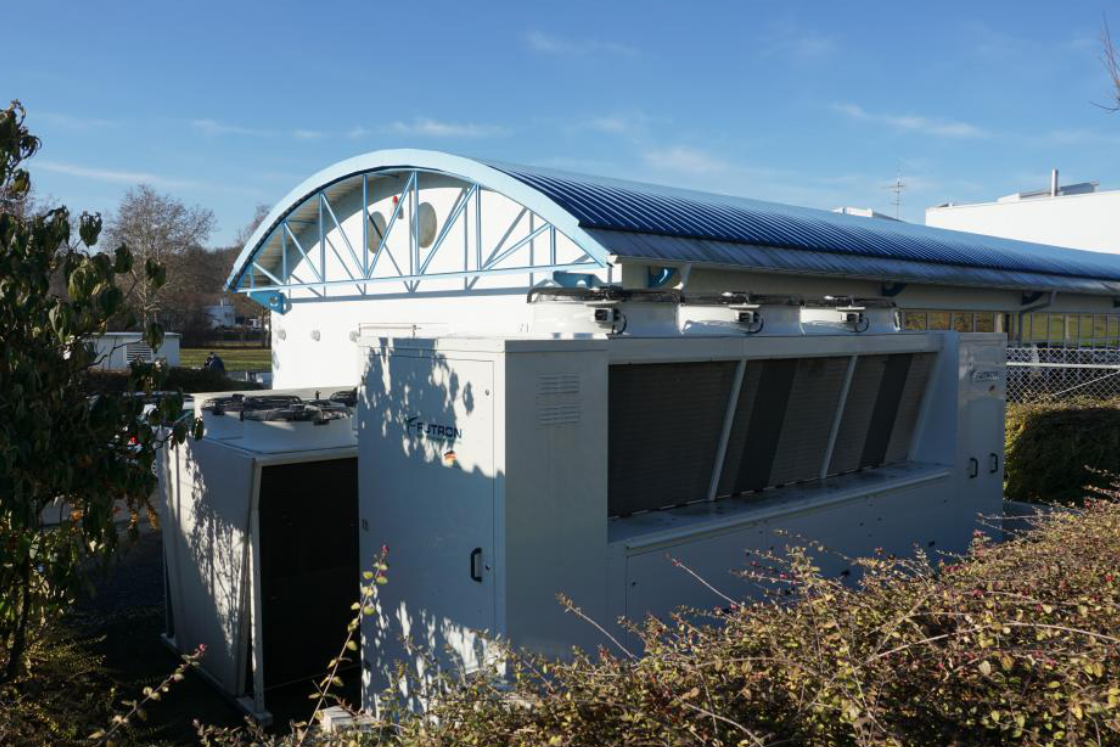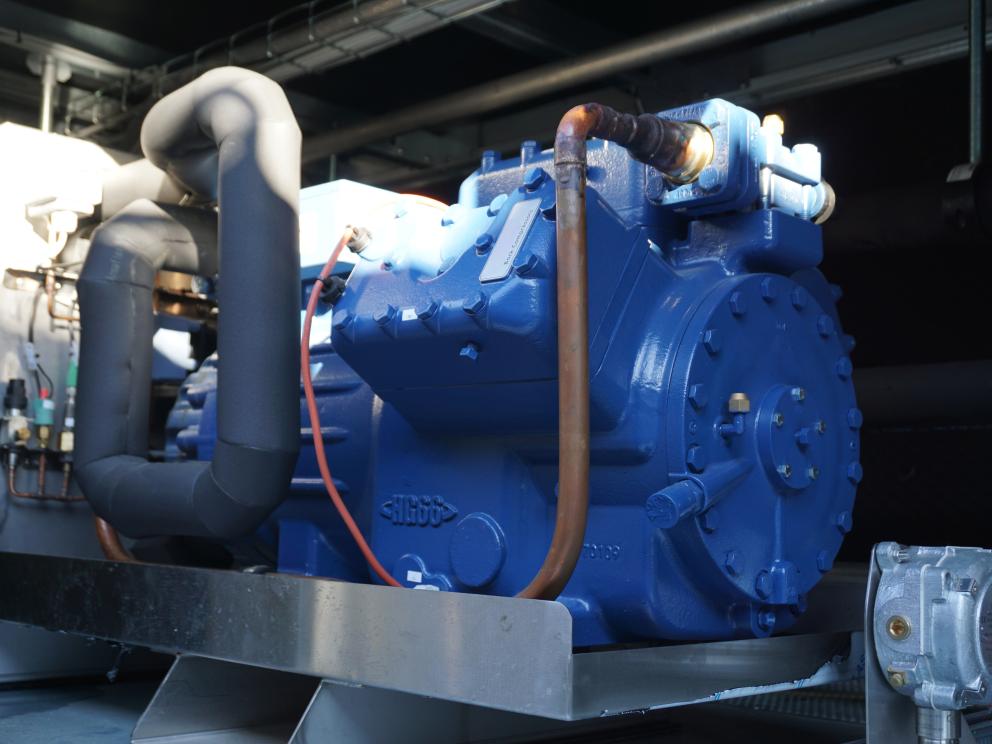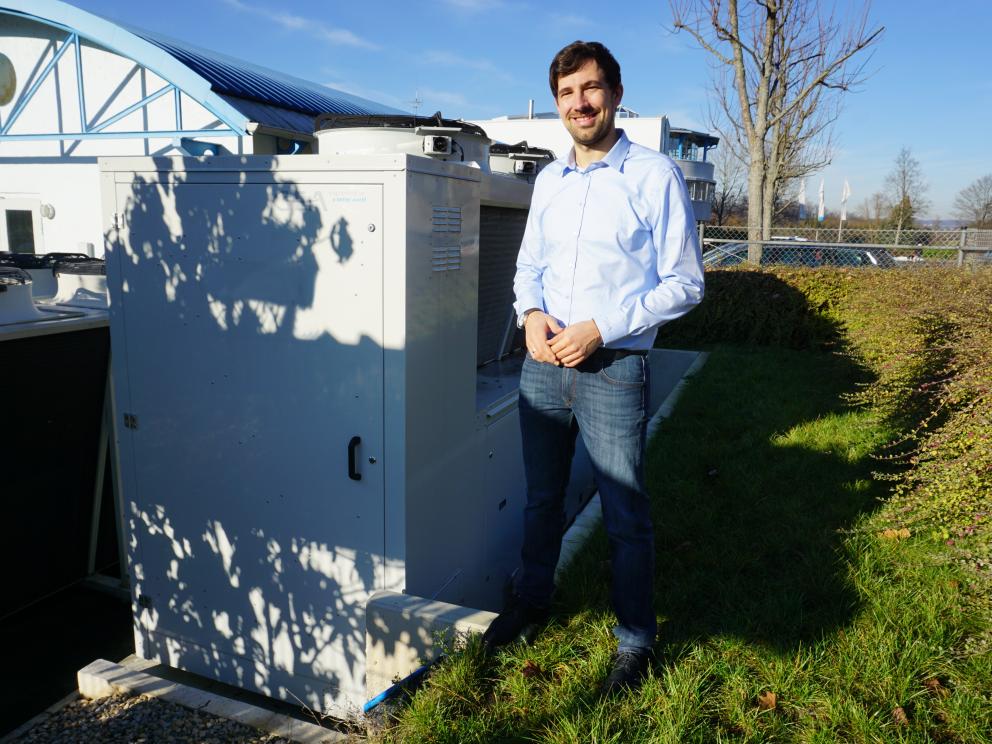Natural and sustainable
BOCK has invested in air-conditioning technology to prepare us all for future summers with extreme temperatures. For a year now, a system operating with propane has been providing extra cooling capacity for maximum air-conditioned comfort in offices. It has also created the ideal testing environment for an in-house development: the HG66e HC semi-hermetic hydrocarbon compressor. Following the successful trial, the HG66e HC is now going into full production.
Previously planned reserves of cooling capacity were depleted
Sometimes when the compressor test beds at Bock GmbH (Frickenhausen) were working to capacity during the summer, it wasn’t just the engineers who were sweating. Up to a year ago, a single system removed heat from the Compressor Test Centre as well as from the administration building. And the test beds always had priority, so compressor tests could be carried out under the required conditions.
If the Test Centre required a large amount of cooling capacity, in extreme cases this was at the expense of air-conditioning elsewhere. This only happened on a few summer days, but the air-conditioning system, which had been designed with some cooling capacity reserves, was depleted on those occasions. In view of the rising output requirements in the compressor test areas and increasingly frequent summer hot spells, it became essential to convert or expand the air-conditioning system.

Propane as a refrigerant: Natural and efficient
To avoid worsening climate change, which has been the cause of hotter summers in recent years, Bock placed great emphasis on having an efficient and environmentally-friendly solution. Synthetic refrigerants with high greenhouse effect were taboo. As a supplier of compressors for air-conditioning and cooling systems, our in-house system also had to have a flagship character: a natural refrigerant was therefore a must.
"Since the main heat load arises in the summer months, propylene and propane were the obvious refrigerants," says Manuel Fröschle, Manager for Application Engineering at Bock and a specialist in natural refrigerants. Systems with these refrigerants also work very efficiently at high ambient temperatures. The choice was finally made in favour of the R290 refrigerant, otherwise known as propane.
Bock has several suction-gas-cooled compressors for hydrocarbons in its product range. The seven sizes with 24 capacity stages from 5.4 to 279.8 m³/h (50 Hz) meant that a suitable compressor could easily be found. "To meet the required 132 kilowatt cooling capacity for the new system, we first selected two frequency-controlled HG56e HC compressors, which harmonised perfectly with the Futron compact chillers," says the product manager.

Redundant solution for optimum partial load operation
The plan was to operate two identical brine chillers at 6 °C forward flow temperature and 12 °C return temperature to air condition the administration building. The redundant solution allows for optimum operation under partial-load conditions. It also allows performance of maintenance during transitional periods between the seasons, without having to shut the air-conditioning down completely. The old system from then on would only cool the compressor test areas.
Field trial with new six-cylinder compressor
Later, there was one notable change in detail to the basic planning: since a prototype of the new HG66e/1340-4 HC could be provided before the brine chillers were installed, it was integrated into the system. Like the smaller HG56e HC, the new compressor is a six-cylinder model, with output between this series and the HG88 HC models. With a displacement of 116.5 m3/h to 180 m3/h (50 Hz), it closes the gap in the range offered. The ultimately installed solution uses an HG56e HC and, in parallel, the prototype of the HG66e HC. Apart from the change of compressor, the originally planned concept for the system was retained.
Controlling output via frequency or switching off the cylinder head
"The ability to subject our first HG66e HC to a field test on our own premises was very appealing," says Manuel Fröschle. The new compressor is not only somewhat larger, it also offers more output and benefits from the mexxFlow valve plate: the combination of a flow-perfected double ring fin design for the valve plate and a cylinder head custom-built for it increases the compressor’s efficiency significantly. For the HG66e HC, output is adjusted by means of a frequency converter, while for the HG56e HC output is controlled by switching off the cylinder head.
Propane: Combustible, but low-risk in operation
Since the thermal energy in the building is dissipated by means of a brine circuit through a heat exchanger, the safety-related aspects required by the combustible propane (or propylene) refrigerant are restricted to the externally installed system, which is situated behind the test hall. The HC compressors used are optimised for the challenges presented by hydrocarbons, so the compressors fully meet expectations for a long service life. For hydrocarbon applications, an oil sump heater and special oil filling are used in the compressor. In addition, the electronic compressor protector is housed in the separate switch cabinet. "The compressors themselves and the Futron chillers are already approved and released for hydrocarbon operation," adds the product manager.

Field test on the HG66E HC successfully completed
"Even in the long and very hot summer of 2018, during which we measured temperatures up to 38 degrees in the shade, there were no complaints," says Manuel Fröschle. The air-conditioning system, which is designed for both efficiency and sustainability, also increases the efficiency of the company staff, since heat stress, which reduces productivity on hot summer days, is now a thing of the past.
He can also dispel any fears that, by changing to hydrocarbons, customers must reckon with high service costs. "Any qualified person who knows how to deal with combustible refrigerants should be able to perform operational and service work. Most of the work is actually possible without even opening the system to any significant degree." He also adds that time-consuming leak checks, such as those required for most systems with synthetic refrigerants, are not required for natural refrigerants, such as hydrocarbons. This means that the natural refrigerants propane and propylene can be used for air-conditioning systems and industrial purposes just as well as CO2 and ammonia, for example, which are generally used in cooling and low temperature applications.
